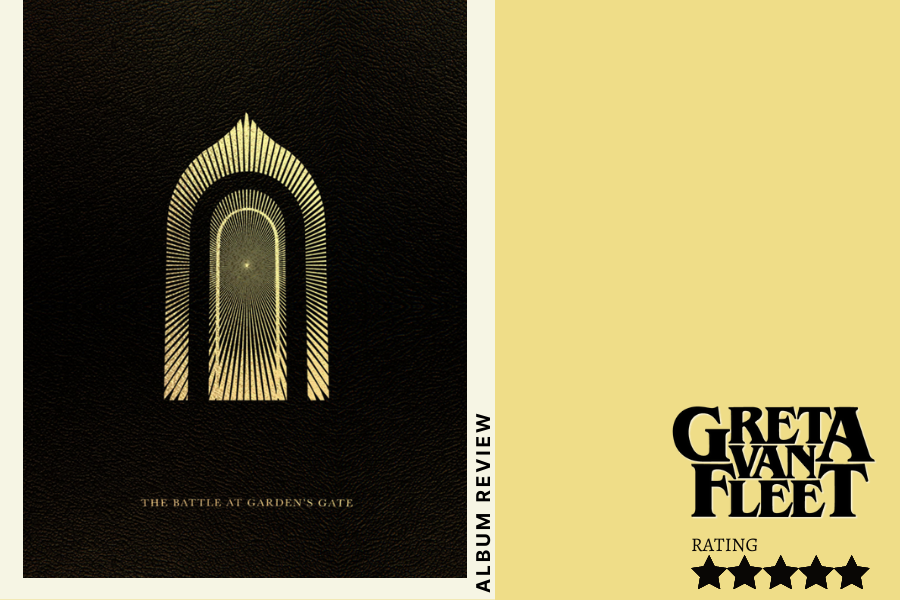‘The Battle At Garden’s Gate’: an ethereal journey into rock
American rock band Greta Van Fleet released its latest album, “The Battle at Garden’s Gate”, on April 16, its first music release since winning a Grammy in 2018. The Sidekick staff writer Olivia Short writes about how the album presents a revival of 1970s rock with a modern twist.
October 7, 2021
Light from flickering candles slowly illuminates the room. Soft notes from a piano are followed by a voice that rings through the silence, a beacon that calls out to any who listen. A siren that bewitches its listeners, fervent in their mission. The Battle at Garden’s Gate has just begun – it’s war cry the dazzling vocals of lead singer Josh Kiszka.
“Heat Above ” graces the ears with an echoing melody of an organ, soon bursting with drums, guitar and Kiszka’s explosive voice. The song gives an ethereal vibe as it pleads for those to not falter in the overwhelming pessimism that encompasses society, but instead encourages listeners to join the march to “not fight for war / But to save the lives of those who do so.” “Heat Above” warms the heart and sends the listener free falling into a beautiful arrangement radiating love.
Following the spiritual experience of “Heat Above,” “My Way, Soon” and “Built By Nations” brings the band closer to its roots with a 1970s rock sound that has listeners reaching to turn up their volume as loud as it will go. One feels gripping naivete reach out as the band leads the way into a world undiscovered with a long way “yet to wander / Many miles far yonder,” feeling how desolate it can be when “all of hell tries to drag you down.”
“Broken Bells” is a lyrical highlight on this album, a gut-wrenching ballad that leaves room for interpretation. A two minute instrumental break applauds the whimsical endeavors of the other members, Sam Kiszka, Danny Wagner and Jake Kiszka, leaving one to interpret the unwritten candor in the expression of their voices through instruments.
As the album progresses, “Age of Machine” leaves darker tones that create a haunting and lasting presence. It digs into themes of human dependency and the desire to find strength to unshackle oneself and attain freedom from “an omnipresent force” that is created by man.
“Tears of Rain” sheds light on looking for a solution to a problem, a drop of rain to ease thirst that is believed to be unquenchable. It questions “who will bring the rain,” a comfort to satisfy the drought that can only be abated by one’s own efforts.
Reaching closer to the end of the album, “Stardust Chords” presents a catchy and edgy mixture of stunning vocals and stellar instrumentals. The lyrics bring in recurring themes from other songs in the album and expand on the concept of human redemption, with biblical references about forgiveness and symbolism in sacrifice such as how “Even sinners go to drink the wine/Break the bread”.
“Light My Love” complements the mind and the infinite love of women. Kiszka’s vocals call out in infatuation, preaching that “Your mind is a stream of colors / Extending beyond our sky.” Although the song feels soft and dreamy, it unexpectedly surrounds one with enchanting volatility.
Taken as a whole, The Battle at Garden’s Gate is impressive in its lyrics and composition, giving a unique flare to modern rock. Greta Van Fleet distinguishes themselves with an undisputed talent that is a force to reckon with. The album offers a new outlook on a common human experience while preaching topics of love and encouragement. Full of allusions and clever wordplay, the group’s sophomore album leaves your jaw dropped with invaluable vocals, heavenly chords, impactful beats and wicked guitar solos.
Follow Olivia (@Olivia_Short1) and @CHSCampusNews on Twitter.











